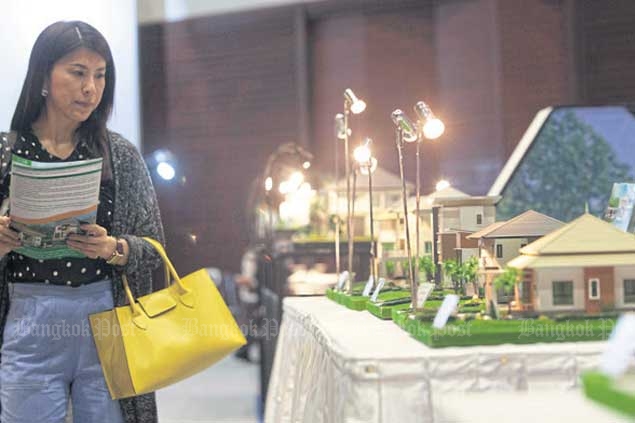2-in-1 strategy in bid to ease new tax pain
Two draft bills to go to cabinet at same time
- Published: 14 Mar 2016 at 06:30 1 comments
- NEWSPAPER SECTION: Business | WRITER: Wichit Chantanusornsiri

Models of new houses are on display at a house and condo fair held in Bangkok. The Finance Ministry will seek cabinet approval for the bill on land and buildings tax. PAWAT LAOPAISARNTAKSIN
Draft bills on the new personal income tax structure and on the land and buildings tax will go before cabinet for approval simultaneously, finance permanent secretary Somchai Sujjapongse says, in a move intended to ease public anxiety over the tax burden.
The Finance Ministry plans to propose both drafts to the cabinet at the same time to show those concerned about the new land and buildings tax that they will be compensated by a lower personal income tax, he said, without saying when the bills will go before the cabinet.
Individual taxpayers will see increases in their annual expense allowance and other deductions, while the proposed land and buildings tax should satisfy all parties, as it will not represent an additional tax burden for people, said Mr Somchai.
He has ruled out a cut of the top personal income tax bracket of 35% for fear such a rate cut would be criticised as only being beneficial for high-income earners. But the new structure will include wider taxable income bands, he added.
A source at the Revenue Department recently said individuals with a monthly income of up to 30,000 baht are likely be exempt from the personal income tax, with the personal allowance ceiling being doubled to 120,000 baht. At present, those earning 20,000 baht a month or less are tax-exempt, based on an expenses allowance cap of 60,000 baht, a 30,000 baht personal allowance and an exemption for taxable income of 150,000 baht or less.
The new tax will be enforced in 2017.
The Finance Ministry will widen the taxable income ceiling for those in the 35% tax bracket to more than 5 million baht from over 4 million at present, while the band for the 30% tax bracket will also be raised to more than 2 million to 5 million baht, up from more than 2 million to 4 million, another source familiar with the matter said.
Personal income tax contributed 302 billion baht, representing 17.5% of the Revenue Department's 1.73 trillion baht revenue stream last year.
The Revenue Department's data showed that 24,709 people declared taxable income of more than 4 million baht in the 2013 tax year. The largest taxpayer group were those earning taxable income of 150,001-300,000 baht per year, comprising 1.63 million people.
Under the current tax structure with seven brackets, taxable income of 150,001 to 300,000 baht is charged at a 5% rate; 300,001 to 500,000 baht is charged at 10%; 500,001 to 750,000 baht is charged at 15%; 750,001 to 1 million baht is charged at 20%; over 1 million baht to 2 million baht is charged at 25%; more than 2 million to 4 million baht is charged at 30%; and over 4 million baht is charged at 35%.
The source said that while middle income earners would not enjoy a modified tax rate, they will benefit from the raised annual expenses cap and the higher personal allowance. Taxpayers whose annual taxable income does not exceed 500,000 baht will also benefit the most from the increases in allowances under the new tax structure.
Separately, the source said the proposed land and buildings tax would not add more to the burden of homeowners than what they currently pay, along with local development taxes.
The Fiscal Policy Office has set the tax ceiling rates at 0.2% of appraisal value for land used for agriculture, 0.3% for residences and 1% for land for commercial use. Undeveloped land would be taxed at 1% for the first three years before doubling to 2% for the next three years, hitting the 3% ceiling only in the seventh year.
The actual tax rate would be levied progressively. Agricultural land would be charged at 0.01% if the appraised price is no more than 2 million baht or up to 200 baht a year, while land worth more than 100 million would be taxed at 0.1%.
Residences appraised at 2 million baht or less would be taxed at 0.03% or up to 600 baht a year while those priced at more than 100 million would be charged at 0.2%. Commercial land would be taxed at 0.1% or up to 2,000 baht a year if the appraisal value is less than 2 million baht and at 0.6% for land valued at more than 1 billion.
Apart from a bid to raise income for local administrative organisations, the tax will prompt higher land utilisation as vacant plots will be taxed at high rate. The tax will also come into effect in 2017.



1 people commented about the above
Readers are urged not to submit comments that may cause legal dispute including slanderous, vulgar or violent language, incorrectly spelt names, discuss moderation action, quotes with no source or anything deemed critical of the monarchy. More information in our terms of use.
Please use our forum for more candid, lengthy, conversational and open discussion between one another.
Click here to view more comments